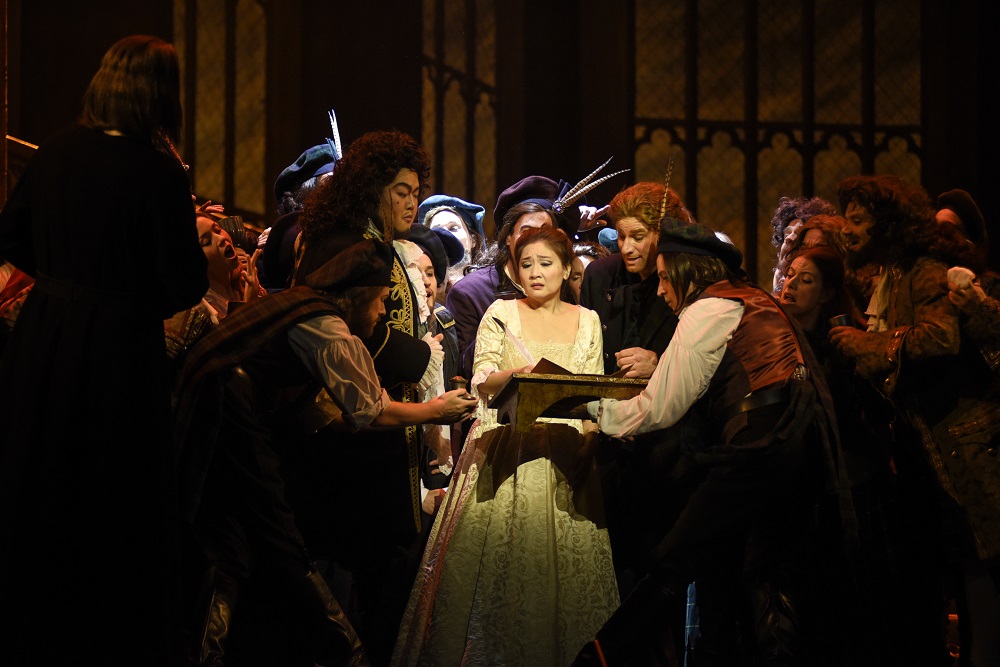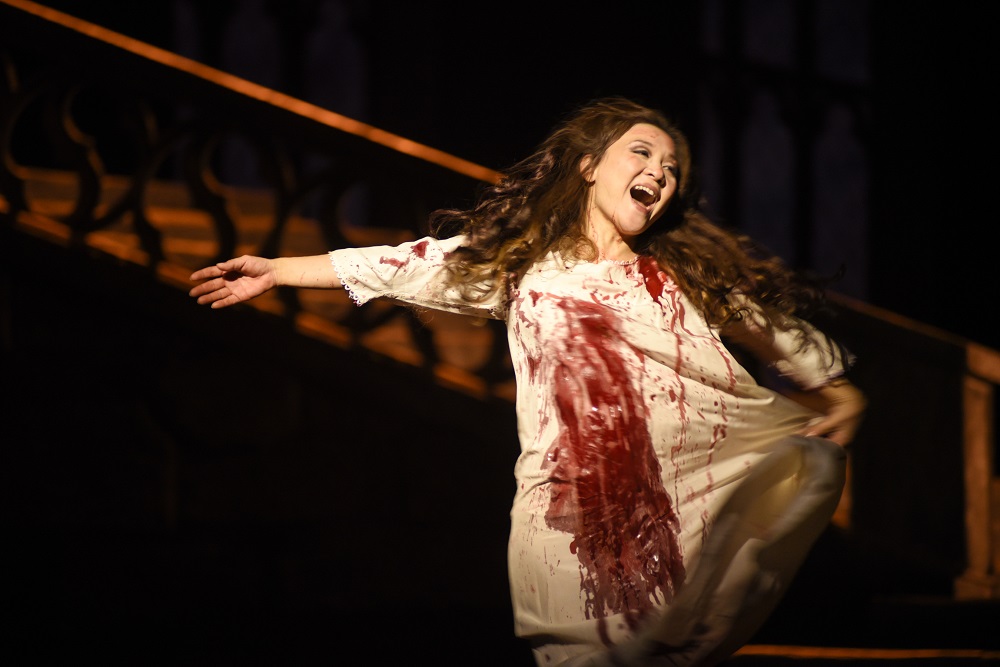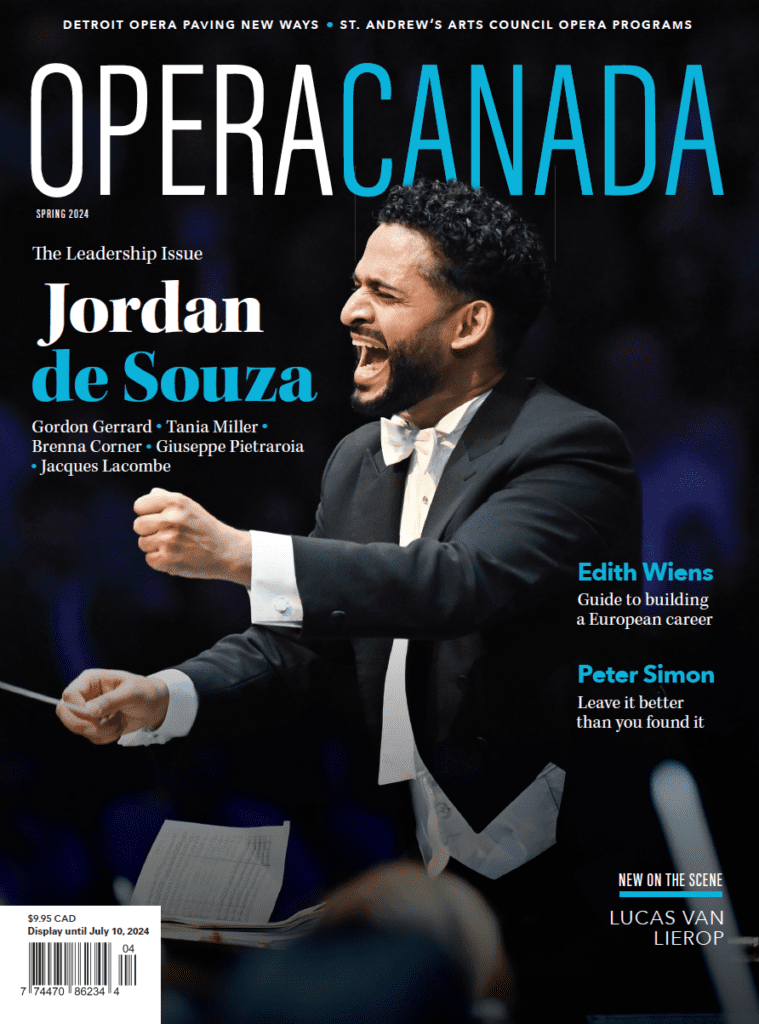The soprano may be the star of Lucia di Lammermoor, but it was the gentlemen who took the night at the Nov. 9th premiere of Opéra de Montréal’s latest take on Donizetti’s classic.
I’ve never been in favour of casting light lyric coloratura sopranos in meaty bel canto roles like Lucia. You need more than a high E-flat and facility in fioritura to do justice to this repertoire. Korean-American soprano Kathleen Kim may have bowled the crowd over with the high notes she’s able to squeeze out, but this is no bel canto voice.
Her high notes are neon-bright and sugary pink, piercing without resonance. Kim has no chest voice; when she sinks down out of the stratosphere the lack of core strength in her sound is exposed and her voice disappears (you couldn’t hear her at all in the sextet). While Kim is undoubtedly vocally agile, she produces a fast tremolo in place of vibrato, making her trills indistinguishable. She lacks true honeyed legato, and her musicality feels breathless and superficial, as if she were rushing through the more grave and foreboding phrases to get to the fast parts.
Kim’s small stature makes her Lucia look vulnerable and childlike, and she can’t help but play to type: girlish and lively rather than fragile and unhinged. Her portrayal, like her musicality, lacked emotional depth. Kim has had success singing Zerbinetta and Olympia, and she seems much better suited to that repertoire.
Vocally, it was the tenors who shone—especially Canada’s own Frédéric Antoun as Edgardo. While not particularly huge or heavy, his voice is dark and rich like strong coffee, with easy, powerful high notes. Antoun married hot-tempered, physical acting with equally passionate, virile singing and his final aria “Tu che a Dio spiegasti l’ali” was deeply moving.
The young Korean tenor Mario Bahg was enormously impressive as Arturo. Bahg won first prize in the aria division of the 2018 Montreal International Music Competition. Still at the start of his career, he’s already approaching the whole package: wonderfully warm, full, bright sound; clear squillo; perfectly even, relaxed production from bottom to top; beautiful legato and diction; and above all exquisite musicality, including tasteful, natural and appropriate use of portamento.
Charismatic Canadian baritone Gregory Dahl brought a steel-and-whisky edge to his singing as Enrico, and used the extreme size difference between himself and Kim to effectively bully and domineer her without ever needing to lay a hand on her.
Atelier Lyrique member Florence Bourget displayed an attractive, dignified, well-projected mezzo as Alisa. Young Moldovan bass Oleg Tsibulko started off the evening stiff and muffled as Raimondo, but he settled and improved by his Act III entrance.
The direction was by Michael Cavanagh, who brought us Opéra de Montréal’s problematic Rigoletto last season. Where some directors gravitate toward excessive abstraction, Cavanagh sins in the opposite direction. Now, in his take of Lucia di Lammermoor, Cavanagh populates his stage with literal ghosts: figures in white sheets and veils that pop in and out of wells and walls every time someone mentions the word death (which, as it happens, is fairly often). Cavanagh strove for a maximally grotesque mad scene, but the results are more clumsy and awkward than chilling. In the cadenza, for example, he has Lucia simper and wave coyly at the flutist in the pit, while she punctuates her flurry of “Ah! Si!” trills by stabbing her knife into the floor.
Robert O’Hearn’s Game of Thrones-meets-Rembrandt sets, borrowed from Florida Grand Opera, are all oscuro with no chiaro. The dark costumes, black backdrops, and generally gloomy lighting made it hard to even make out what was happening, and resulted in some unfortunate ‘floating head’ effects (not counting the ghosts).
I heard the Orchestre Métropolitain play Fidelio splendidly under Yannick Nézet-Séguin two weeks ago, but they rarely produce the same quality when their beloved maestro isn’t on the podium. Conductor Fabrizio Ventura specializes in this repertoire, and his ideas and intentions were correct and clearly communicated. The execution, however, was lackluster.
Lucia di Lammermoor continues at Salle Wilfrid-Pelleteir Nov. 14th and 17th.








